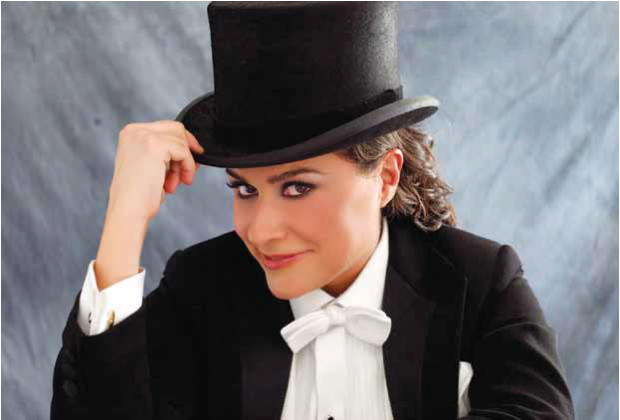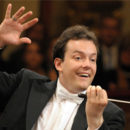
Cecilia Bartoli – Between virtuosity and emotion
Even if the divas in the world of classical music are mostly sopranos, the mezzo-soprano Cecilia Bartoli is definitely one of them. She is one of the few artists who has managed to attract a different crowd of people to lyrical classic music; every CD of hers is an event that incites the world of music through its courage of addressing forgotten repertoires or through the original performances of the those repertoires.
She was born in Rome in 1966, into a family of musicians. Her debut followed at nine in a small role in Tosca and at 14 years she began to take flamenco lessons, thrilled by the exoticism and passion for life of Southern Spain. Only at 16 did she realize that she had a special voice and unusual voice agility and that this technique should not be wasted. She then starts taking canto lessons at the Conservatory of Santa Cecilia in Rome, and in 1986, during a show dedicated to Maria Callas at the Italian television, she is spotted by Herbert von Karajan who, two years later, invites her to sing with him at the Salzburg Festival – project unfinished due to the death of the conductor. At 21 she already performs Rosina in The Barber of Seville and Cherubino in The Marriage of Figaro; at 22 she records Rossini ‘s Silk Ladder at Decca label (with which she still works today) and focuses for a while on Mozart’s repertoire working with Daniel Barenboim and Nikolaus Harnoncourt. She performs Rossini’s pieces (to which she pays a particular interest), Mozart, Haydn, Handel, Bellini, Puccini and records 20 CDs ranging from baroque music to the music of the twentieth century.
In 1999, Cecilia Bartoli comes with a big surprise that will change in a way, the world of classic music: The Vivaldi Album. The album, recorded with Il Giardino Armonico and Giovanni Antonini, was a huge success and sold over a million copies. But the important fact is that Bartoli has set, with this CD, a new standard in Baroque music through an extraordinary vocal technique, an almost abnormal virtuosity and especially through the intense emotion that it transmits. Before Bartoli’s interpretation it used to be enough to have a good voice doubled by a correct interpretation. However, now, music lovers long for virtuosity and interpretations full of intensity and strong feelings. With a stretch of two and a half octaves Cecilia Bartoli can perform soprano pieces, but she thinks that the most important aspect of classical music is to create a certain atmosphere, to convey moods, feelings and emotions, because without them the interpretation is limited to simple velocity and becomes rather a sport competition. Two years after this album event she recorded with the same team live from Paris Viva Vivaldi DVD that can be accessed on YouTube. For those seeking thrills, “Armatae do et anguibus ” from Vivaldi Juditha Triumphans is worth listening to.
Then followed some reference recordings: aria recitals by Gluck (considered by experts the best album with the music of the composer), another with Salieri arias; Opera proibita album (again, for those looking for a thrill, a must listen is the aria Un pensiero nemico di pace by Handel), then the series of Bartoli’s projects as the mezzo-soprano has a passion for discovering forgotten composers and bringing them to the attention of the public.
In 2008 she recorded an album dedicated to the Spanish soprano Maria Malibran, Rossini’s fetish soprano (200 years from her birth). In 2009, the album Sacrificium is dedicated to music written for castrated including mostly first auditions combined with famous arias such as Ombra mai fu by Händel. The album is accompanied by a file of one hundred pages, of documented and inspired illustrations which tell the story of famous singers emasculated at 6-7 years to preserve their soprano voice. Her latest passion, Agostino Steffani (1654-1728) composer, diplomat and spy leads to the release of the `Mission’ CD followed by two other recordings of the music of the almost forgotten Italian composer.
Luckily, her celebrity and record sales allow Cecilia Bartoli to enjoy recording, as it is always what she wants, and to fulfill her true passion: discovering forgotten composers, who would remain only in the volumes of the music history without the enthusiasm of some musicians .
In 2013 she triggered a small scandal in the music world with Bellini ‘s Norma (performing next to the soprano Sumi Jo and the conductor Giovanni Antonini), because it does not follow the traditional interpretation of this work and, after studying the manuscript, Bartoli proposed a new way of phrasing which revolted some and enchanted others. Musical press was pro or against, but as always, Cecilia Bartoli has not left anyone indifferent because, as it happens with great artists, she stirs either excitement or irritation.
The year 2014 is almost entirely focused on the music of Rossini, with performances showing five different roles of the composer’s works; some of these at the Salzburg Whitsun Festival, whose artistic director she is. Hopefully at some point someone inspired will invite her to Bucharest for a concert at the Athenaeum. Until then we will be enjoying her albums.









